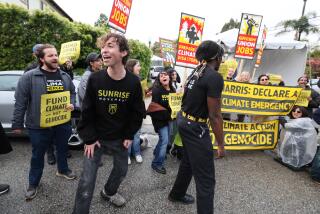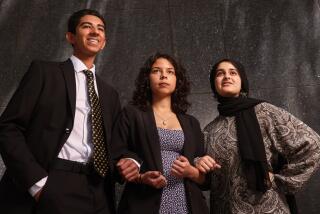The rebel
- Share via
JUST before noon on March 6, 1970, Cathy Wilkerson was ironing freshly washed sheets in her father’s Greenwich Village town house when she heard a roar and felt the burnt-orange-carpeted floor beneath her tremble and then collapse. Already, at 25, a leader of the antiwar resistance, Wilkerson had been hurrying to put the house in order before her father returned that night, but as debris flew and walls shattered, she writes, “I noted with resignation that this was one mess I was not going to be able to clean up.”
As she describes it in “Flying Close to the Sun: My Life and Times as a Weatherman,” the blast was a shock but not a mystery: Downstairs in the basement, her boyfriend, Terry Robbins, a 22-year-old who understood almost nothing about explosives, had been busy making bombs full of nails.
Robbins and two friends died in the explosion. When Wilkerson emerged, she quickly fled, and she spent the next decade as a fugitive, folding herself into the Weather Underground, where for a few years she continued her efforts to destabilize the American political system. As terrible as the accident was, however, she realized that success -- dynamiting the officers’ club at Fort Dix, N.J. -- would have been much worse. “We had been into a death trip,” Wilkerson admits. “We had given up.”
According to Time magazine, the explosion in the town house defined Wilkerson, who turned herself in to the police in 1980 and served a brief sentence, as “so perfect a symbol of the times as to be almost a macabre caricature.”
But, as she demonstrates in her clear-sighted, self-critical yet unapologetic account of her formative political years, the “symbol” was in reality a complicated and vulnerable young woman -- an all-too-human idealist who had tried electoral politics, nonviolent protest and boycotts, only to surrender to violence, which she saw as the last remaining option.
“The final threads holding me to the idea of participatory democracy had frayed and broken,” she writes. “I had come to accept that, as Mao said in his little red book of quotations, political power did ultimately grow from the barrel of a gun.”
Appalling words -- but less appalling coming as they do three-quarters of the way into Wilkerson’s gracefully written and scrupulously researched memoir. It is a detailed and humble reckoning of someone who did her best to navigate a fractured social landscape one awkward step at a time, honoring the conscience her New England Quaker upbringing had instilled in her even as she rushed pell-mell toward “a foolproof plan to bring equality and justice to the world.”
Wilkerson confesses her weaknesses, the movement’s failures (“Moderation,” she notes, “was not a Weatherman trait”) and her considerable misgivings, both as an activist and in hindsight. But she never renounces the ideals that drove her. She allows you to understand her choices even as she rejects them. In the end, she insists, “the gravest mistake” is not to choose the wrong tactics but to fail to act against injustice at all.
More to Read
Sign up for Essential California
The most important California stories and recommendations in your inbox every morning.
You may occasionally receive promotional content from the Los Angeles Times.













